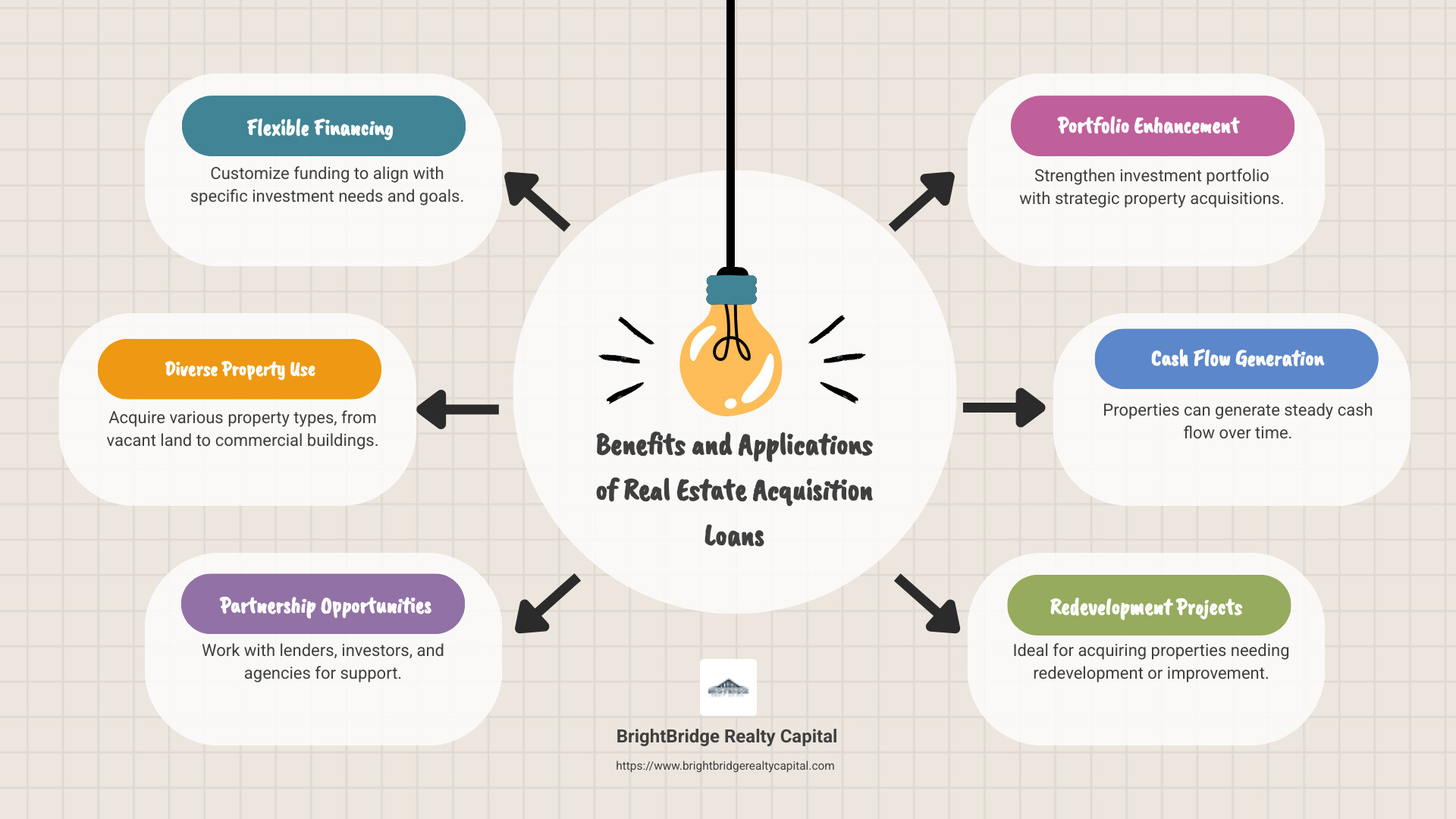Unlocking Opportunities: Real Estate Acquisition Loans Explained

Real estate acquisition loans offer a pathway for investors to secure properties that can improve their portfolios and generate steady cash flow. These loans are designed to facilitate the purchase of land or existing real estate, which can range from undeveloped plots to distressed properties needing redevelopment or existing buildings intended for remodeling.
Why consider real estate acquisition loans?
- Flexible Financing: Tailor funding to fit specific community or investment needs.
- Diverse Use: Purchase various types of properties, from vacant land to commercial spaces.
- Partnership Opportunities: Collaborate with lenders, investors, and agencies for additional support.
Now, let’s explore more about how these loans function, various types available, and how to leverage them for successful property investment.

Quick real estate acquisition loans terms:
Understanding Real Estate Acquisition Loans
Real estate acquisition loans are a key tool for investors looking to purchase real estate properties. They provide the necessary funding to acquire land or buildings, whether for commercial, residential, or mixed-use purposes. These loans are essential for anyone aiming to expand their real estate portfolio, especially when liquid capital is limited.
What Are Acquisition Loans?
Acquisition loans are specialized loans given to purchase a specific asset. They are different from typical loans because they are tied to the asset being purchased. This means the property itself often serves as collateral. If the borrower defaults, the lender can reclaim the property to recover losses. This setup makes acquisition loans a more secure option for lenders, which can sometimes lead to more favorable terms for borrowers.
Funding for Real Estate Investors
For real estate investors, acquisition loans are a powerful vehicle to secure properties without having to pay the full price upfront. This leverage allows investors to purchase high-value properties with a smaller initial outlay. For instance, a developer might use an acquisition loan to buy a distressed property, renovate it, and then sell or lease it for a profit.
Case Study: The Skyland Apartments in Washington, D.C., is a great example. Enterprise Community Development used an acquisition loan to preserve 224 affordable residential units. This loan not only facilitated the purchase but also helped revitalize the community by maintaining affordable housing options.
Purchasing Real Estate Properties
The primary use of acquisition loans is to purchase real estate properties. These can include:
- Vacant Land: Ideal for new developments, such as affordable housing or commercial spaces.
- Existing Buildings: Perfect for renovation projects or converting into community facilities.
- Distressed Properties: Opportunities for rehabilitation and neighborhood revitalization.

These loans can be custom to fit the specific needs of a project. Whether you're looking to develop a new site or acquire an existing structure, acquisition loans provide the flexibility needed to bring these projects to life.
Leveraging Acquisition Loans for Success
By understanding and utilizing acquisition loans, investors can strategically grow their portfolios. These loans not only offer financial leverage but also open doors to partnerships with other stakeholders, such as government agencies or nonprofit organizations.
Quote: "Acquisition loans are a cornerstone for community development projects, providing both the financial means and the flexibility to address unique community needs." 
In summary, real estate acquisition loans are an invaluable resource for investors and developers. They offer a practical way to secure properties and achieve investment goals, all while contributing to community growth and development.
Up next, we dig into the different types of real estate acquisition loans available and how to choose the right one for your needs.
Types of Real Estate Acquisition Loans
When it comes to real estate acquisition loans, investors have several options to consider. Each type of loan has its own features and benefits. Understanding these can help you choose the right financing for your project.
Bank Loans
Bank loans are a common choice for real estate acquisitions. They often offer competitive interest rates and structured repayment terms. However, they usually require a strong credit history and substantial documentation. Banks typically prefer borrowers with a steady cash flow and valuable assets as collateral.
Lines of Credit
Lines of credit provide more flexibility compared to traditional bank loans. They allow you to withdraw funds up to a certain limit as needed, making them ideal for projects with varying cash flow needs. This type of financing can be especially useful for developers working on multiple properties at once, as it allows for quick access to funds without reapplying for a new loan each time.
Private Lenders
Private lenders can be a lifeline for those who might not meet the strict criteria of banks. These lenders often offer more flexible terms and faster approval processes. However, the trade-off is often higher interest rates and fees. Private lenders may focus on the potential value of the property rather than the borrower's credit history, making them a viable option for riskier projects.
Mezzanine Financing
Mezzanine financing is a hybrid of debt and equity financing. It allows the lender to convert the debt into an equity interest if the loan isn't repaid on time. This type of financing is often used in larger, more complex real estate transactions. It provides a way to secure funding without giving up too much control over the project. However, it typically comes with higher costs due to the increased risk to the lender.
Each type of real estate acquisition loan serves different needs. Whether you're looking for the structured approach of a bank loan, the flexibility of a line of credit, the accessibility of private lenders, or the complexity of mezzanine financing, understanding these options is key to making an informed decision.
In the next section, we'll explore the key considerations you need to keep in mind when applying for an acquisition loan.
Key Considerations for Acquisition Loans
When diving into real estate acquisition loans, several crucial factors play a big role in your success. Let's break down these key considerations to help you make the best decision.
Collateral
Collateral is a safety net for lenders. It's what they can claim if you can't repay the loan. For acquisition loans, the property you're buying often acts as collateral. But lenders don't just look at the property's value. They also consider its "quick sale value"—how much it could fetch if sold quickly. Having additional collateral, like other assets, can also make your loan application stronger.
Developer’s Cash Flow
Your cash flow is your financial lifeline. Lenders want to see that you have a steady stream of income to cover loan payments. It's not just about having money in the bank; it's about showing you can manage your finances effectively. A solid cash flow reassures lenders that you can handle the loan's obligations.
Exit Plan
An exit plan is your strategy for how you'll pay back the loan. It's like a roadmap for lenders to see how you plan to succeed. Will you sell the property? Refinance it? Rent it out for steady income? A clear, detailed exit plan can make lenders more comfortable with offering you a loan. It shows them you're thinking ahead and have a strategy in place.
Loan Agreement
The loan agreement is the fine print you can't ignore. It outlines the terms and conditions of your loan. This includes interest rates, repayment schedules, and any penalties for early repayment. It's vital to read and understand every part of this agreement. Sometimes, the complex nature of these agreements can hide clauses that could impact your project's flexibility and risk.
In summary, when considering real estate acquisition loans, think of collateral, cash flow, exit plans, and the loan agreement as your guiding stars. These elements not only help you secure a loan but also ensure you're prepared for the journey ahead. Next, we'll dive into the role of acquisition and development loans in changing properties into construction-ready parcels.
The Role of Acquisition and Development Loans
Acquisition and development loans are essential for real estate investors eager to transform raw land into construction-ready parcels. These loans are not just about buying land; they are about turning potential into reality.
What Are Acquisition and Development Loans?
These loans are designed to help developers purchase land and make necessary improvements. The goal? To prepare the land for construction. This includes tasks like subdividing lots, grading, and installing essential infrastructure such as roads and sewer lines.
The loan typically covers the purchase of the land and a significant portion of the development costs. However, developers often need to provide a substantial down payment, usually in cash. This ensures they have a stake in the project and helps manage the risk for lenders.
Property Improvements
Improving the property is a major part of the development process. With the funds from an acquisition and development loan, developers can make the land suitable for construction. This involves various improvements, like:
- Subdivision of Lots: Breaking down larger parcels into smaller, buildable lots.
- Grading: Ensuring the land is level and stable for building.
- Infrastructure Installation: Constructing roads and installing utilities like water, electricity, and sewer systems.
These improvements are crucial for turning a piece of land into a viable development project.
Creating Construction-Ready Parcels
The end goal of using an acquisition and development loan is to create construction-ready parcels. These are parcels of land that are fully prepared for building. They have the necessary infrastructure and meet zoning and regulatory requirements, making them attractive to builders and investors.
Acquisition and development loans are a bridge. They connect the raw potential of undeveloped land with the opportunity for profitable construction projects. By understanding and leveraging these loans, developers can open up the true value of a property.
In the next section, we'll explore how to apply for a real estate acquisition loan, guiding you through the necessary steps to secure the funding you need.
How to Apply for a Real Estate Acquisition Loan
Applying for a real estate acquisition loan might seem daunting, but breaking it down into simple steps can make the process more manageable. Here’s a straightforward guide to help you steer the application process.
1. Gather Your Financial Statements
Start by collecting two years' worth of financial statements and tax returns. Lenders need these documents to assess your financial health and determine your ability to repay the loan. Ensure these records are accurate and up-to-date.
2. Develop a Solid Business Plan
A well-crafted business plan is crucial. It should outline your project, including your goals, strategies, and expected outcomes. This plan demonstrates to lenders that you have a clear vision and a roadmap for success.
3. Understand Zoning Information
Before applying, check the zoning information for the property you wish to acquire. Zoning laws dictate how the land can be used and developed. Make sure your project aligns with these regulations to avoid any legal problems.
4. Submit the Interest Form
Once you have your documents ready, submit an interest form online. This is the first step in expressing your intent to apply for a loan. The form signals to lenders that you are serious about pursuing funding.
5. Work with a Program Manager
After submitting your interest form, a program manager will reach out to you. They will assist you in completing the loan application process. This includes ensuring all your documents are in order and helping you address any missing information.
6. Complete the Application Review
Once your application is complete, it will be reviewed by the lender. If you meet the eligibility criteria, you’ll work with a loan officer to finalize the commitment process. Do not start any work on the project until you receive written approval.
7. Seek Technical Assistance
If needed, technical assistance is available both before and after you purchase the property. This support can be invaluable in ensuring your project runs smoothly.
Following these steps will help you steer the application process for a real estate acquisition loan. In the next section, we’ll answer some frequently asked questions about these loans to further clarify any uncertainties you might have.
Frequently Asked Questions about Real Estate Acquisition Loans
What is a real estate acquisition loan?
A real estate acquisition loan is a type of loan specifically designed for purchasing real estate assets. These loans are often used by developers and investors to buy properties like vacant land, existing buildings, or distressed properties. The goal is to preserve, renovate, or redevelop these assets for community benefits, such as affordable housing or commercial spaces.
Key Point: Unlike other loans, acquisition loans are strictly for the purchase of the property, not for renovations or repairs. The borrower covers those costs separately.
How do acquisition loans differ from other real estate loans?
Acquisition loans are distinct from other real estate loans in a few ways:
Purpose-Specific: They are solely for purchasing real estate, unlike construction loans, which fund both the purchase and the construction or renovation of a property.
Transactional Funding: Acquisition loans provide immediate capital to secure a property quickly, which is crucial in fast-moving real estate markets.
No Construction Draw Process: Unlike construction loans, acquisition loans do not require the borrower to go through a draw process to access funds for construction.
These differences make acquisition loans ideal for investors who need to move quickly to acquire properties.
What are the eligibility criteria for acquisition loans?
To qualify for an acquisition loan, borrowers typically need to meet certain criteria:
Credit History: A solid credit history is crucial. While some lenders may have specific credit score requirements, others might be flexible, especially if the borrower can provide additional collateral or a co-signer.
Operating Business: Many lenders prefer borrowers who have an established business or investment track record. This reassures them of the borrower’s ability to manage and repay the loan.
Loan Terms: Borrowers should be prepared to demonstrate a clear exit strategy. This means having a plan for how they will repay the loan, whether through refinancing, selling the property, or generating rental income.
Understanding these criteria can help you prepare a strong application and increase your chances of securing a real estate acquisition loan.
These FAQs should clarify some common questions about real estate acquisition loans. Next, we’ll discuss the conclusion and how BrightBridge Realty Capital can assist you with customized financing solutions.
Conclusion
At BrightBridge Realty Capital, we specialize in offering customized financing solutions that cater to the unique needs of real estate investors. Our goal is to empower you with the tools and resources you need to seize opportunities in the real estate market swiftly and effectively.
One of our standout features is our commitment to fast closings. We understand that time is often of the essence in real estate transactions. That's why we strive to provide funding within a week, ensuring you can act quickly on promising deals without unnecessary delays.
Our approach to direct lending sets us apart. By eliminating intermediaries, we offer competitive rates and a seamless process that makes securing a loan straightforward. This direct connection allows us to tailor solutions specifically to your investment strategy, whether you're purchasing vacant land, acquiring existing buildings, or redeveloping distressed properties.
If you're ready to explore the possibilities of real estate acquisition loans with a partner who values speed, flexibility, and personalized service, contact us today. Let's open up opportunities together and help you achieve your real estate investment goals.


